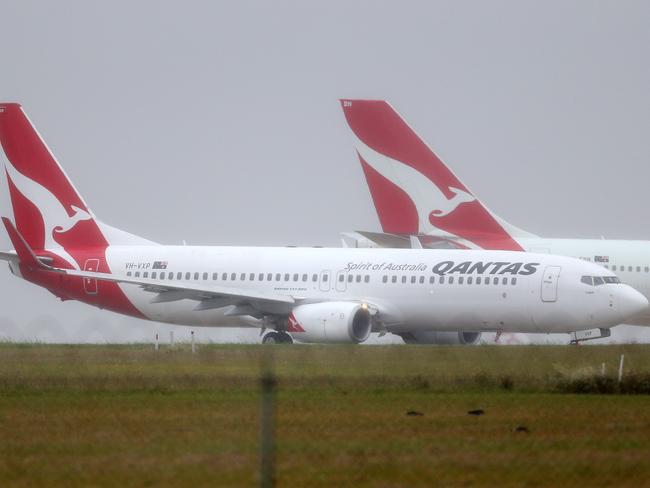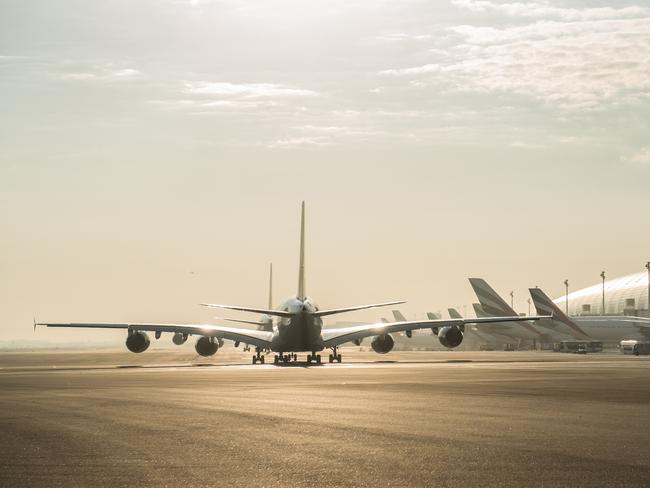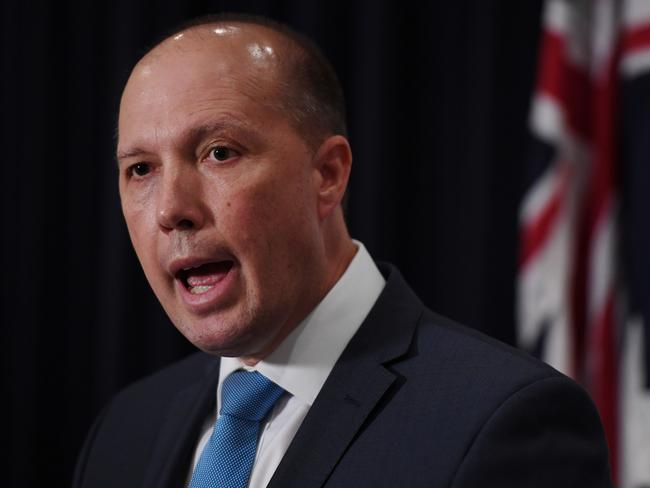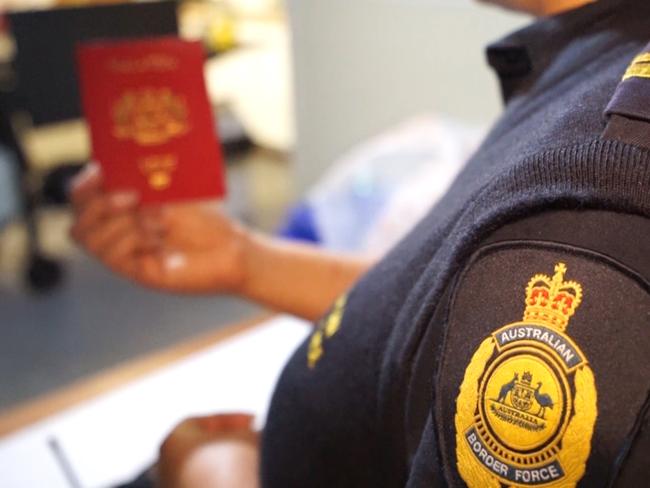How Australia has deployed agents to offshore airports to stop ‘threats’ to national security
BORDER Force officers are working with Qantas and Emirates to stop hundreds of criminals from entering Australia. These are some of the evil people they’ve caught.

Work
Don't miss out on the headlines from Work. Followed categories will be added to My News.
EXCLUSIVE - Special Investigation
HUNDREDS of terror suspects and sympathisers, organised crime figures, drug traffickers and illegal immigrants have been stopped from boarding flights to Australia.
In an extraordinary but low-profile national security program, potential undesirable visitors are being stopped from boarding planes in airports in the Middle East and Asia.
In the last month alone, more questionable visitors have been blocked from coming to our shores, predominantly attempting to enter Melbourne and Sydney, than during the whole of the previous year.
With little fanfare or announcement, Australian Border Force (ABF) has now deployed an unspecified number of Airline Liaison Officers (ALOs) for security coverage of 50 air hubs across the globe to work with host governments and airlines — predominantly Qantas and its partners including Emirates — to vet those coming to Australia.
Specifically, according to their unpublished charter, they have been deployed to prevent people coming to Australia illegally “who may intend to cause harm to the Australian population”.
Internal figures and profile sheets obtained by News Corp Australia, has found between July 1 and August 30 this year alone, 153 passengers had been “offloaded” from flights for being “genuinely documented but non-genuine travellers”.
This compares with the total of 136 passengers offloaded for the same reason as well as “posing a risk to the border” or misrepresenting their travel intentions over the whole 2016-17 financial year.
The border risk includes blocked passengers deemed by security agencies ABF, Australian Federal Police (AFP) and ASIO to be suspected of terrorist offences or sympathisers with extremist views and whose detection at the gate is reported to local authorities or allied security agencies.

It was noted by ABF the alarming jump in the last month’s average eclipsing the previous year’s total stemmed from better intelligence and linked data and liaison establishment with foreign governments and border security counterparts.
It has been learned since 2013, there have been 1043 passengers stopped offshore from travelling to Australia by ALOs.
This is on top of the more high profile potential visitors knocked back by the Immigration department or detained on arrival.
“Since the establishment of the ABF, global conflict and the flow of people across borders have increased,” an internal report on the ABF’s ALO operation states.
“ALO’s have ensured that they maintain a greater alertness to the movement of terrorists or returning foreign fighters.
“As a result of long established, close working relationships with host nation government officials, ALOs receive information regarding the movement and activities of people that may be a national security concern or are suspected of travelling to or from foreign conflict zones.”

The ALOs are in key Asian and Middle East air hubs and transit points for direct flights to Australia, with agreement from host countries and airports, including Indonesia, Philippines, Malaysia, Singapore, China, Seoul, Dubai and Doha.
National security sources have confirmed to News Corp Australia that Australian passport carrying foreign fighters and Islamic extremists have returned home to Australia, predominantly having left in 2012-13 for the Arab spring uprisings.
Critically though, they said the offshore ABF officers have been able to provide invaluable real-time flagging of their movement throughthe hubs and provide details of whom they are travelling and associating with during their trips.
“We can’t stop them coming back because they are Australians but with our law enforcement partners we can monitor their movements and associations,” they said.

According to the ABF, their ALOs are skilled in examinations of travel document like passports and visas and assessing passengers based on how they made travel arrangements and present themselves.
“ALOs work in strong partnership with airlines, airport security groups, host governments and international liaison officers from other countries,” a spokesman said, adding they were an integral unit to the integrity and security of Australia’s borders.
“Located at check-in and boarding gates, ALOs detect and deter the travel of passengers intending to travel on fraudulent identities or passports.”

Immigration Minister Peter Dutton, set to head the newly created Homeland Security super ministry taking in the ABF, AFP and ASIO, yesterday said the global security environment was increasingly complex with new and evolving threats confronted everyday.
“We need to be agile in how we deal with these threats and this includes having a multi-layered approach to national security.
“This offshore network of officers captures critical information for our intelligence and law enforcement agencies and gives us the ability to intercept individuals who might pose a threat before they board a flight.”
WHO THEY’VE CAUGHT
CASE 1
A Somali-born British national was offloaded from a flight from Doha to Melbourne due to concerns around his intentions and purpose. It was suspected the passenger may have been travelling to Australia to espouse radical views.
“The fast response and attention from the ALO stationed in Doha resulted in the passenger being refused travel to Australia.”
CASE 2
An ALO working closely with Emirates airline security intercepted a passenger of North African decent travelling on a French passport and with two other French nationals. In liaison with border security authorities in the UK and Middle East, all three were “known” and wanted by French authorities.
“The passenger travelling as an impostor had an extensive criminal record, was allegedly implicated in a murder and was restricted from travelling out of France to Australia. The three passengers were offloaded and returned to France.”

CASE 3
A passenger at the boarding gate of an Emirates flight from Dubai to Sydney was “intuitively” deemed to be suspect. Authorities in Sydney were alerted as he had already boarded and left. A search of his luggage on arrival found he was carrying two Dubai Duty Free bags with tins of Arab Delights Chocolates and a bottle of Johnnie Walker Black Label.
“Examination of the goods revealed 171 pellets substituted for chocolates and 74 pellets contained within the ‘Johnnie Walker’ box that contained cocaine.”
CASE 4
An ALO in Kuala Lumpur received advice a Kuwait passport holder had attempted to check-in for an Emirates flight to Melbourne. He was listed as wanted on INTERPOL and after being questioned at the gate was found to be carrying a fake passport.
“The passport was assessed as fraudulent. The biodata page had been dismantled, altered and reassembled. The passenger maintained that he was a Kuwaiti citizen but previous similar cases indicate that this methodology is being used by Iraqi, Iranian and Palestinian nationals.”
Despite being turned away, some days later he attempted another entry to Australia from Bali on another passport and was again detected by ALO officers there.
CASE 5
Two Afghanistan nationals were interdicted in Hong Kong attempting travel to Australia on Malaysian passports. The group of five passengers consisted of two Afghan, two Malaysian and one Indonesian who had travelled from Kuala Lumpur to Hong Kong. The Indonesian and Malaysian passengers’ intention was to covertly facilitate the two Afghan nationals onto separate Australia bound flights using fake Malaysian passports.
“The passengers were refused boarding in Hong Kong and referred to local authorities.”

CASE 6
An Albanian national attempted to travel to Melbourne on an Italian passport. He had already cleared border control points in airports in France and England. As the passenger attempted to check-in in Dubai the ALO was alerted that the Italian passport was listed as stolen on the INTERPOL database. He was prevented from travel to Australia.
CASE 7
In February this year a Malaysian national was interdicted attempting to travel to Australia using a fraudulently obtained passport. The traveller was selected and after interview with an ALO was identified as having been removed from Australia in December 2016 for overstaying their visa. A further application for a visa had also been refused. The traveller was denied boarding the plane to Australia.
CASE 8
Two passengers were intercepted attempting to travel to Melbourne from Dubai on suspected fraudulently obtained but genuinely issued Italian passports. Both passengers were off-loaded and referred to immigration authorities.
“They were questioned and appeared to have limited understanding of the Italian language and could not provide information about their claimed region and country of origin, Italy. It is suspected neither are from Italy and the documents were falsely acquired.”

CASE 9
Two passengers, one a Canadian passport holder and one a Taiwanese passport holder, interdicted attempting to board a flight to the Gold Coast. The passenger on the Taiwanese passport was found to be an impostor and the Canadian was genuine but admitted he was being paid to smuggle the Taiwanese man in. Both passengers were offloaded.
CASE 10
A Hong Kong national was interdicted by an ALO attempting to travel to Melbourne. It was suspected that the passenger was travelling on a fraudulent passport using a false name. The passenger was questioned and later admitted to changing their name as they were currently subject to a three-year exclusion period after overstaying their visa. The passenger was subsequently offloaded from the flight.


